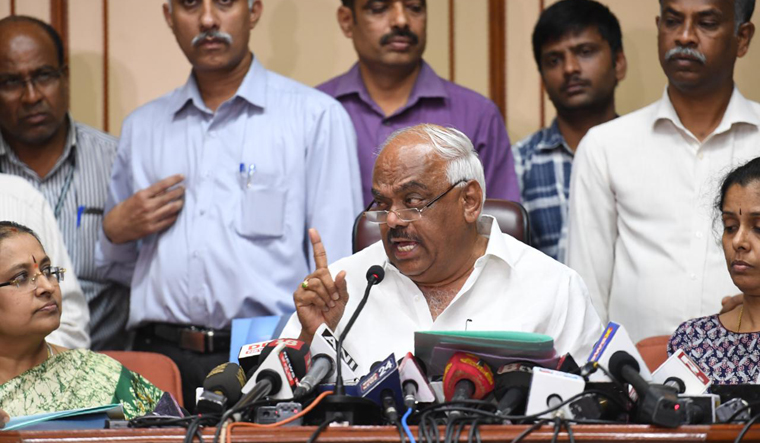The Karnataka assembly speaker K.R. Ramesh Kumar, on Sunday, disqualified 14 additional MLAs from the Congress-JD(S) coalition government. Narayana Gowda who represents KR Pet, K. Gopalaiah who represents Mahalakshmi Layout and A.H. Vishwanath from Hunsur were among those disqualified from the JD(S). K. Sudhakar from Chikaballapur, M.T.B. Nagaraj from Hoskote, Srimanth Patil from Kagwad, Roshan Baig from Shivajinagar, Anand Singh from Vijayanagara, S.T. Somasekhar from Yeshwanthpur, Shivram Hebbar from Yellappur, Pratap Gowda Patil from Maski, Byrati Basavraj from KR Puram and Munirathna from RR Nagar were those disqualified from the Congress side. According to reports, the speaker has not yet taken action against BSP MLA N. Mahesh, who abstained from voting on trust vote day, and against whom the BSP leadership had moved a disqualification petition.
ALSO READ
- Ravi's remarks amount to criminal offence; evidence available against BJP leader: Siddaramaiah
- Karnataka: BJP leader C.T. Ravi alleges Congress conspiracy to harm him with help of police
- Karnataka: CT Ravi granted interim bail, BJP asks how protestors got access to Suvarna Soudha
- ‘He called me a prostitute’: Karnataka minister Laxmi Hebbalkar’s big allegation against C.T. Ravi
- Karnataka health minister Dinesh Gundu Rao blames 'flaws' in drug control system for maternal deaths
- Karnataka: Did state BJP chief Vijayendra offer bribe to bury Waqf report?
Now, the house strength, after the 17 disqualifications (including three last week), has fallen to 207. The BJP needs 104 to prove its majority on Monday, and they have 105 MLAs. There is one independent MLA and the Congress-JD(S) combine has a strength of 101.
However, the disqualification means that, under the purview of the anti-defection laws, none of the rebel MLAs can become a minister in the duration of the 15th legislative assembly, which will last till 2023. If the BJP did indeed promise ministerial berths to at least some among the rebel MLAs, it remains to be seen how they will react.
BJP's Yediyurappa was sworn in as the chief minister of Karnataka at 6:45pm on Friday. In a period of political uncertainty for Karnataka, 15 MLAs from the Congress-JD(S) coalition had rebelled; in the trust vote that followed, the government fell by 7 votes (98 votes to 105). Yediyurappa had watched the opportunity slip from his hands in the aftermath of the May 2018 assembly elections, when the Congress-JD(S) combine pipped the aspiring chief minister to the post.
This will be the fourth stint for Yediyurappa as the chief minister—the last one was after the May 2018 Assembly polls. He had to resign just three days after being sworn in, unable to muster majority after staking claim to form the government on the grounds that his party had emerged as the single largest one with 104 seats in the 225-member assembly.
Yediyurappa has to play a balancing act by ensuring that those within the party are not sidelined, while also accommodating the rebel Congress-JD(S) legislators, whose resignation led to the collapse of the coalition government and helped the BJP to come to power, sources added. These disqualifications might save Yediyurappa the trouble of doing that, while at the same time leaving the rebel MLAs out to dry.
A bench headed by Chief Justice Ranjan Gogoi in its order had given the assembly speaker the freedom to decide on the resignation of the 15 MLAs within such time-frame as considered appropriate by him.


